 | |
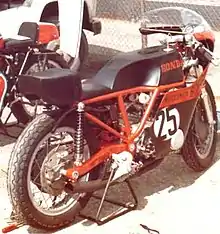 Bimota Honda HB1 at Imola racetrack in 1973 | |
| Type | Private |
|---|---|
| Industry | Motorcycle manufacturing |
| Founded | 1973 in Rimini, Italy |
| Founder | Valerio Bianchi Giuseppe Morri Massimo Tamburini |
| Headquarters | Rimini , Italy |
Area served | Worldwide |
| Products | Motorcycles |
| Parent | Italian Motorcycle Investment S.p.A. (IMI) (50.1%) Kawasaki Heavy Industries (49.9%)[1] |
| Website | bimota |
Bimota is an Italian manufacturer of custom and production motorcycles. It was founded in 1973 in Rimini by Valerio Bianchi, Giuseppe Morri, and Massimo Tamburini. The company name is a portmanteau derived from the first two letters of each of the three founders' surnames: Bianchi, Morri, and Tamburini.
Products
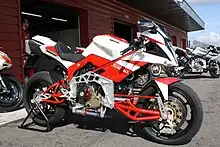
Because the state of frame design was stagnant in the 1970s,[2] Bimota concentrated initially on building high-quality motorcycle chassis around existing engines. From the beginning they customised the top models of Suzuki, Honda and Kawasaki. During the late 1970s, Bimota also helped develop and build motorcycles branded as Lamborghinis. In the 1980s they also customised Yamaha and Ducati motorcycles.
Bimota's co-founder and long-time chief designer Tamburini has been an influential player in the development of other Italian brands, most significantly his work on the popular Ducati 916, the Ducati Paso, and the MV Agusta F4; other designers such as Bimota chief Sergio Robbiano have also been involved with larger-volume manufacturers.
More recent Bimota models included the DB5, DB6, DB7, DB9 and the Tesi, with a DB8 featuring the Ducati 1198 engine. The Tesi 3D was especially unusual, which, along with the co-designed Vyrus, was the only motorcycle then in production to use hub-center steering.
Racing
Bimota first experienced international racing success in 1980 when Jon Ekerold, a true privateer, won the 350cc world championship on a Yamaha-powered Bimota.[3] They also experienced success in the early years of the Superbike World Championship. Virginio Ferrari won the 1987 Formula TT title aboard a YB4 EI, partnering with Davide Tardozzi. Tardozzi won five races in the inaugural 1988 world superbike championship, more than any other competitor, but inconsistent results relegated him to third place in the final standings.[4]
After many years without success, the Australian rider Anthony Gobert caused a major shock in 2000 by winning a wet race at Philip Island on a Bimota SB8K. The Alstare team entered a Bimota BB3 package into World Superbikes in 2014 for riders Ayrton Badovini and Christian Iddon, however, the bike initially did not have enough units in production to pass the championship's homologation rules. As a compromise, the bikes were allowed to enter from round 2, but ineligible for points until homologation was achieved. At the end of the year, the team finished unclassified and disqualified.
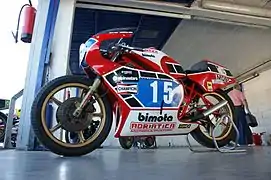 Bimota YB3
Bimota YB3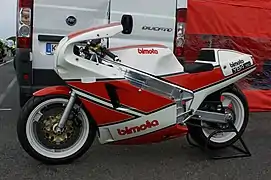 Bimota YB4
Bimota YB4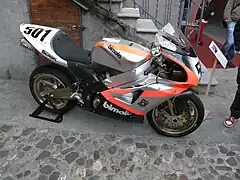 Bimota SB8K of Anthony Gobert
Bimota SB8K of Anthony Gobert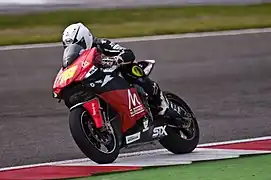 Bernat Martínez on Bimota HB4 at the 2010 British motorcycle Grand Prix
Bernat Martínez on Bimota HB4 at the 2010 British motorcycle Grand Prix Brandon Cretu on Bimota BB3 at the 2015 Senior TT
Brandon Cretu on Bimota BB3 at the 2015 Senior TT
Bankruptcy and rebirth
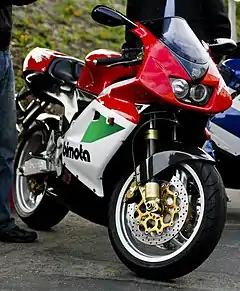
The V Due, introduced in 1997, had a design flaw with its engine.[5] Bimota was forced to abandon the novel fuel injection system and re-engineer the entire engine.[5] Bimota ultimately recalled the entire run of the V Due, and made an improved version, the 'Evoluzione'. Only 340 original V Dues and 21 Evoluziones were built.[5] While this was occurring, during the 2000 World Superbike season, one of Bimota's main sponsors disappeared, owing the company a great deal of money. The combination of events forced Bimota to file for bankruptcy and close their doors.
In 2003, new owners of the marque assets, Lorenzo Ducati and Giuseppi Della Pietra, formed Alternativa Moto, with the intention to manufacture all-Italian machines using Ducati engines, and sold the V-Due rights to Win-Win.[6]
A new group of investors purchased the rights to the Bimota name and designs and restarted the company. The investors that bought Bimota, Marco Chiancianesi who is the president and his business partner Daniele Longoni are both active Scientologists.[7]
Recent reports paint a less optimistic picture for the future of Bimota. In 2017, the factory at Rimini had reportedly closed,[8] with spares and incomplete bikes mothballed elsewhere, possibly in Switzerland.
In October 2019, Kawasaki Heavy Industries purchased a 49% stake in the company,[9] and soon after announced an intention to manufacture Bimota bikes using parts from the Kawasaki supply chain.[10]
Models
.jpg.webp)
.jpg.webp)
- Racing motorcycles
- 2021 motorcycles
- Bimota Tesi H2
- Bimota Tesi H2 Carbon
- Bimota KB4
- Bimota KB4 RC
See also
Notes
- ↑ "Greeting by Kawasaki Heavy Industries, Ltd. Mr.Hiroshi Ito, B and Motion S.A. (former BIMOTA S.A.), Mr.Marco Chiancianesi and Mr. Pierluigi Marconi" (PDF). 9 November 2019.
- ↑ "The Ultimate History of Fast Motorcycles", By: Brown, Ronald. Pages 148-149, 174-175, 210-211, 230, 248-249, 286-287 Published by Parragon Publishing 2002. ISBN 1-4054-5466-0
- ↑ Noyes, Dennis; Scott, Michael (1999), Motocourse: 50 Years Of Moto Grand Prix, Hazleton Publishing Ltd, ISBN 978-1-874557-83-8
- ↑ "1988 World Superbike Championship final standings". worldsbk.com. Archived from the original on 17 February 2013. Retrieved 13 January 2013.
- 1 2 3 Cormier, Jason. "Bimota V-Due 500 - The Bike That Killed Bimota". www.odd-bike.com. Retrieved 13 March 2019.
- ↑ "Back from the brink. Bimota reborn". Motorcycle Sport & Leisure, July 2003, pp.59-61. Accessed 12 July 2022
- ↑ "Meet a Scientologist - Bimota Motorcycles". 10 April 2018.
- ↑ "Storied Italian Motorcycle Company Bimota Hits Another Bump in the Road".
- ↑ "Kawasaki Acquires Bimota".
- ↑ "Pre-production Bimota KB4 Coming Summer 2020". 10 February 2020.
References
- "The Ultimate History of Fast Motorcycles", By: Brown, Ronald. Pages 148–149, 174–175, 210–211, 230, 248–249, 286-287 Published by Parragon Publishing 2002. ISBN 1-4054-5466-0.
- Bimota.it Historical Models. Accessed October 5, 2012. http://www.bimota.it/en/storia_modelli.asp%5B%5D
- Bimota.it Company History. Accessed October 5, 2012. https://web.archive.org/web/20121027002943/http://www.bimota.it/en/storia.asp